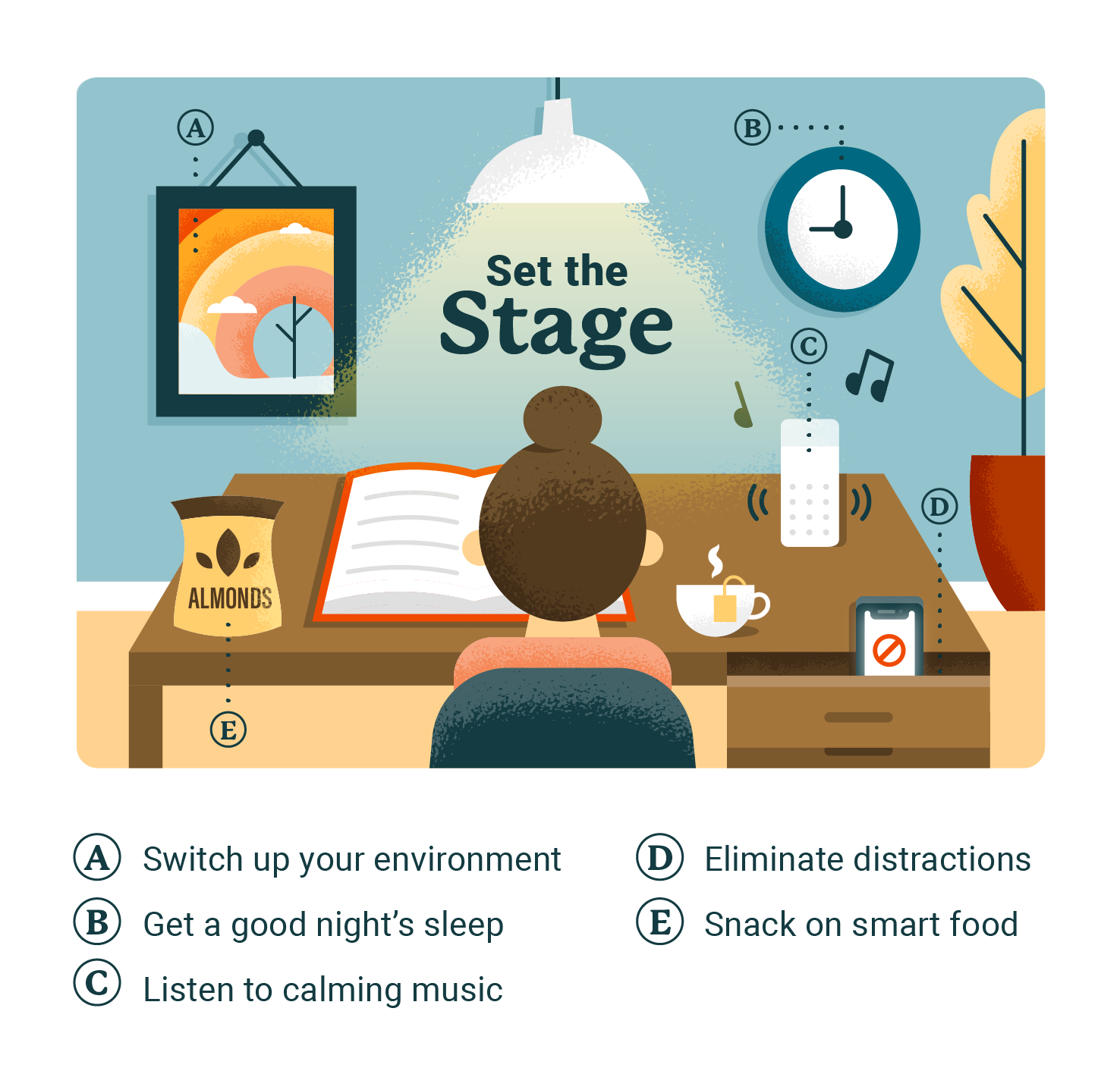Efficient Studying: Proven Strategies to Maximize Your Learning
Studying effectively is not just about spending hours with textbooks and notes. It’s about maximizing your focus, using the right methods, and ensuring you’re absorbing information in the most efficient way possible. In this article, we’ll share scientifically backed tips and practical strategies for efficient studying, helping you get the most out of your study time.

Why Efficient Studying Matters
Efficient studying allows you to absorb more information in a shorter period of time, freeing you up for other tasks while still mastering the material. When you study effectively, you also retain more knowledge long-term, improving your ability to recall information during exams or in real-life situations.
Benefits of Efficient Studying:
-
Maximized Retention: When you study efficiently, you’re more likely to retain the material.
-
Better Time Management: You spend less time studying, allowing you to focus on other activities.
-
Reduced Stress: With more effective study habits, you’re less likely to feel overwhelmed.
Efficient studying isn’t about working harder, it’s about working smarter. By using the right strategies, you can maximize your results while reducing the time you spend on each task.
1. Set Clear and Achievable Goals
One of the most crucial aspects of efficient studying is setting clear and specific goals. Without a goal, it’s easy to become distracted and waste valuable time. By defining what you want to achieve, you give yourself direction and motivation to stay on track.
How to Set Effective Study Goals:
-
Use SMART Goals: Make sure your goals are Specific, Measurable, Achievable, Relevant, and Time-bound.
-
Break Large Tasks Into Smaller Pieces: Tackle one small section at a time to make studying less overwhelming.
-
Set Realistic Deadlines: Allocate a set amount of time for each task and stick to it.
By setting clear goals, you create a roadmap for your study sessions and ensure that you stay focused and motivated.
2. Create a Productive Study Environment
A cluttered, noisy, or uncomfortable environment can hinder your ability to focus. For efficient studying, it’s essential to have a dedicated, quiet space free from distractions. Your environment plays a significant role in your concentration levels and overall productivity.
Tips for Creating the Perfect Study Space:
-
Choose a Quiet Spot: Find a place where you can concentrate without interruptions.
-
Organize Your Workspace: Keep your desk neat and have all necessary materials at hand.
-
Adjust Lighting and Comfort: Ensure your study space is well-lit and comfortable to avoid distractions.
An organized and distraction-free study space allows your mind to focus entirely on the task at hand.

3. Use Active Learning Techniques
Active learning engages your brain in the process, making the information stick better and ensuring better long-term retention. Instead of passively reading or listening, try techniques that involve direct interaction with the material.
Active Learning Methods:
-
Summarize the Material: After reading a section, summarize it in your own words.
-
Teach Someone Else: Explaining the material to others forces you to process and understand it more deeply.
-
Use Practice Tests: Simulating exam conditions helps reinforce knowledge and identify weak spots.
By involving yourself actively in the learning process, you are more likely to understand and retain the information.
4. Manage Your Time Wisely
Effective time management is key to efficient studying. Procrastination and disorganization can waste precious study hours. Time management techniques, like the Pomodoro Technique, can help you stay focused and make the most of your study time.
Time Management Strategies:
-
The Pomodoro Technique: Study for 25 minutes, followed by a 5-minute break. After four sessions, take a longer break.
-
Time Blocking: Dedicate specific times of the day for certain subjects or tasks to ensure balanced study time.
-
Prioritize Tasks: Start with the most challenging tasks first when your energy and focus are at their peak.
By managing your time effectively, you maximize your efficiency and ensure that each study session counts.
5. Take Regular Breaks
It may seem counterproductive, but taking breaks actually helps improve focus and productivity. Study sessions without breaks lead to burnout and reduce retention. Short, regular breaks refresh your mind and help you stay sharp.
Why Breaks Are Essential:
-
Prevent Mental Fatigue: Breaks give your brain time to recharge, preventing burnout.
-
Improve Focus: Short breaks help you return to your tasks with renewed concentration.
-
Increase Productivity: Regular intervals of rest have been shown to increase overall productivity.
Remember, taking breaks doesn’t mean wasting time—it helps keep your mind fresh and ready to absorb more information.

6. Use Study Aids and Tools
Studying doesn’t have to be done alone. There are plenty of resources and tools that can make studying more effective and efficient. Whether it’s flashcards, educational apps, or online resources, these tools can help reinforce learning.
Useful Study Aids:
-
Flashcards: Great for memorization and reinforcing key concepts.
-
Study Apps: Apps like Quizlet, Anki, and Evernote can help you organize and study efficiently.
-
Online Learning Platforms: Websites like Coursera and Khan Academy offer in-depth courses and tutorials to supplement your study.
These tools enhance your study sessions and provide additional methods for reinforcing the material.
7. Take Care of Your Body and Mind
Physical and mental well-being play a crucial role in efficient studying. If you’re tired, hungry, or stressed, your ability to concentrate and retain information is compromised. Prioritize self-care to ensure you’re in the best shape to study effectively.
Tips for Staying Healthy While Studying:
-
Get Enough Sleep: Aim for 7-9 hours of sleep each night to optimize brain function and memory retention.
-
Stay Hydrated and Eat Well: Drink plenty of water and eat brain-boosting foods like nuts, berries, and leafy greens.
-
Exercise Regularly: Physical activity improves mental clarity and focus, so try to include exercise in your routine.
Taking care of your body and mind ensures that you’re operating at your full potential, making your study sessions more efficient.
8. Review Regularly
Reviewing material regularly reinforces what you’ve learned and prevents you from forgetting important information. Spaced repetition—reviewing information over increasing intervals—helps strengthen memory retention.
Effective Review Techniques:
-
Spaced Repetition: Review information shortly after learning it, then gradually increase the interval between reviews.
-
Weekly Reviews: Set aside time each week to go over what you’ve learned and fill in any gaps.
-
Group Study Sessions: Sometimes studying with peers helps reinforce concepts and allows for different perspectives.
Regular review ensures that information is moved from short-term to long-term memory, making it easier to recall when needed.

FAQs About Efficient Studying
1. How can I avoid procrastination while studying?
Break your tasks into smaller, manageable chunks and set short deadlines. This makes studying feel less overwhelming and more achievable.
2. What should I do if I can’t concentrate?
Try the Pomodoro Technique to break your study time into short bursts. You can also take a quick walk or stretch to reset your focus.
3. How much time should I dedicate to studying each day?
It depends on your goals, but aim for 1-3 hours of focused study time each day, with regular breaks to avoid burnout.
4. Should I study alone or with a group?
Both have their benefits. Studying alone allows for focused concentration, while group study can provide new insights and reinforce learning. It’s best to mix both depending on the material.
5. How do I stay motivated during long study sessions?
Set small, achievable goals and reward yourself when you accomplish them. Break the session into smaller intervals to keep your focus sharp.
Conclusion
Efficient studying is about more than just spending time with your textbooks. By implementing clear goals, creating an ideal study space, and using effective learning techniques, you can maximize your productivity and retention. Don’t forget to take care of your mind and body—good health plays a significant role in academic success.
Start applying these strategies today and watch your study sessions become more effective and rewarding. With the right tools and mindset, you can achieve your academic goals more efficiently than ever before.








